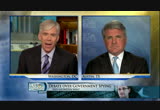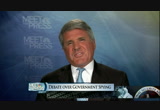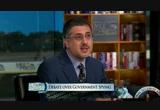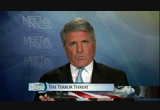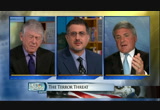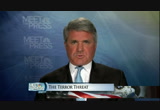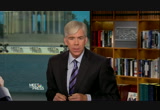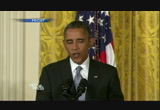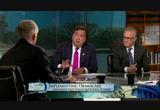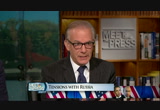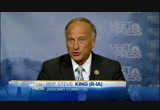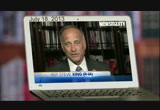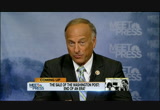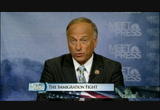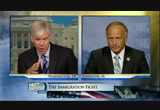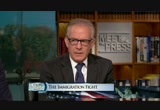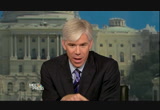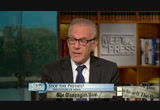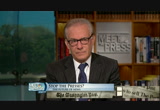tv Meet the Press NBC August 12, 2013 3:00am-4:01am PDT
3:00 am
surveillance program so many people are talking about, including a change in how the nsa collects phone records, more transparency by the secret foreign intelligence court, that's the fisa court, and the creation of a task force of private citizens. joining me this morning barton gellman of "the washington post" who has been writing extensively about edward snowden and the nsa, special correspondent for nbc news ted koppel, and the chairman of the house homeland security committee, republican congressman mike mccaul. barton gellman, let me start with you. has edward snowden won? has he accomplished what he set out to do, which is not only get a debate going but force change in these programs? >> he has accomplished far more than anyone in his position could have reasonably hoped to have accomplished. he told me his greatest fear was that he would come out and do this and whole story would be -- you know, roiling around for a day and it would be gone. now you have president obama being forced to say that he welcomes the debate, which he
3:01 am
welcomes sort of like the ceo who gets an angry letter yet writes back and says thank you for your interest in our surveillance programs. but it's top of the ageneral da for two months. >> the president spoke out about snowden during his press conference on friday and said the following. >> i don't think mr. snowden was a patriot. as i said in my opening remarks, i called for a thorough review of our surveillance operations before mr. snowden made these links. i actually think we would have got on the same place, and we would have done so without putting at risk our national security. >> chairman mccaul, do you believe that, that this administration really did welcome the debate, that he would have reviewed these surveillance programs were it not for edward snowden? >> i see no evidence of that. i think snowden came out, leaked this information, and the white house has been backtracking ever since.
3:02 am
i think when the story initially broke, the president went under cover and finally came out last friday trying to come up with ways to salvage the program by window dressing, forming a website, for instance, an outside group. and the problem fundamentally is he's failed to explain these programs which are lawful, which have saved lives, which have stopped terrorist plots. he has not adequately explained them or defended them. and now he's in a bit of a mess, and i'll it will you why. because on the heels of the irs scandal, where people don't trust this government, this administration with their tax records, they sure don't trust this administration with their phone records. i think that's the dilemma the president is in right now. >> there is a bigger role here, ted koppel. in terms of public concerns about government, the size of government, intrusiveness of government. but isn't the trump card on national security always what i've talked to intelligence officials about, look, if you back away from these programs,
3:03 am
people can die? some of these plots that we could stop with them will get through the filter. >> look, you've got a couple of problems here. problem number one is that you've got the almost infinite technical capability these days of funding information by intruding on people's privacy. once you have that capability, it becomes very difficult to keep it in check. that's what the president is talking about. he's saying trust us, we're not going to violate your constitutional rights, we're only going to dig just so far. it's unrealistic because, as you say, when lives are at stake, when security is at stake, which politician, which national leader is going to say, yeah, we have the capability of getting that information but let's not do it? >> right. that to me, chairman mccaul, raises another question, the issue of speed. the reason why the fisa court was set up, and bart, you can jump in on this as well, is if you identify a threat, you've got data to run that against to
3:04 am
determine if there's a plot against the united states. you need a warrant and you need it fast. government's got to act fast to apprehend those people who might be responsible. introducing privacy advocates and others who might dissent in this process, is that realistic? do you think congress will vote to make that happen? >> i'm in a unique position to talk about this. i actually applied for fisa warrant as a counterterrorism prosecutor, and i think the idea of having a public defender -- you know, really, it is a search warrant to the fisa court, which you wouldn't have in a normal criminal case, would slow down the efficacy and efficiency of our counterterrorism investigation. so i don't think that's the right way to go. i will tell you again, when i was doing this, we would run the numbers through the private phone carriers. we never really imagined that all this data would be warehoused under the nsa. and i think that's what's giving the american people a lot of pause right now. and i think that's what needs to be explained to the american people. and congress will be reviewing this issue in section 215 of the
3:05 am
patriot act to see if this is expanded beyond the original intent of the law. >> what actually changes, bart? do you think there's much room here to fundamentally change these programs? because all the nsa says is, look, maybe we could change who controls this meta data, which is in this virtual vault, and who has access to it and how it's kept, which may be not enough for those who think there's a problem. >> well, congress may decide not to allow the nsa or via the fbi to collect every single call record of every single american for this purpose. that's not what the president's argument sounded like in his news conference. he sounded like he wanted to, as you say, just put a little more oversight on it internally, within the executive branch, and to sort of be slightly more transparent about how it happens. his justice department put out a long white paper defending exactly the way it works now. and honestly, they put a lot of, you know, good, smart minds to work on it, but i think sort of
3:06 am
9 out of 10 civil procedure professors would have given that less than an "a" grade. >> ted koppel, let's widen this out. this is against the backdrop of an ongoing terror, an ongoing threat, reflected in psychology of fear which you wrote about in the "the washington post" this week. america's chronic overreaction to terrorism, we have created an economy of fear, an industry of fear, a national psychology of fear. al qaeda could have never achieved that on its own. we have inflicted it on ourselves. >> fundamentally, there are two sets of questions that apply in the war against terrorism. the one set of questions deals with the where's it going to happen, what's going to happen, and when is it going to happen. the other set of questions deals with what is it that our enemy, the terrorists, are trying to achieve? what are they trying to induce us to do? take a look at what's been
3:07 am
happening over the past week. with a conference call, al qaeda has effectively shut down 20 u.s. embassies around north africa and the middle east. we just had the president of yemen here for a meeting with president obama. he goes back feeling wonderful about his new relationship with the president. next thing the president does is says in effect, sorry, but we don't trust you yemenis to protect your embassies so in effect we shut down our embassy, we have an emergency evacuation. what does that do to our relationship in the rest of north africa? what does that do in our relationship in the middle east? with all of these governments. the terrorists have achieved more with one phone call than we have achieved with all our response. >> chairman mccaul? >> you know, well, listen, i think -- the threat's real. and what i call the narrative of the president saying that al qaeda is on its heels, the
3:08 am
struggle's over, let's go back to pre-9/11 mentality, i think it's very dangerous narrative. i get the same threat briefings that the president of the united states does. and i'm not seeing his rhetoric meeting reality. and the fact of the matter is there is a spider web. you know, we were just focused on pakistan, afghanistan, iraq. this core al qaeda versus non-al qaeda, al qaeda everywhere, distayshaun prince without difference. it's all al qaeda. >> can i interrupt you, chairman? >> and it's spreading. it's getting worse, not better. and i think the american people need to know that. and i believe it's very deceptive for this president to give a narrative that is pretty much over when, in fact, what i see is a spider web throughout northern africa, into syria, egypt, pakistan, afghanistan. this threat is getting worse, not better. >> but the interruption there was your assertion about a pre-9/11 attitude, where do you see that demonstrated by the
3:09 am
president? the most recent example, you had 19 embassies that were closed in the face of a threat. that's what ted koppel is criticizing in terms of overreaction. where is the lack of vigilance that you see that says we're in a different place mentally? >> i think it's the hypocrisy that he wants this rhetoric that the war is going to be over. he wants to sculpt a legacy where he is a peacemaker ending bush's wars, with the same time he's ramping up drone strikes. now, i favor drone strikes, but drone strikes are not going to kill an ideology. and i think this is a war of ideology that's going to be a long-term struggle that we all have to be very adult about. and it's going to be around for quite some time. and the threat is not getting -- again, it's not getting less, it's getting worse, and we need to deal with it in a responsible way and not put our head in the sand. and i think impacting the moderate muslim, the moderate muslim community, is an effective tool that we have wholly failed to engage in. >> ted koppel, let me come back
3:10 am
to this krd. i think what the president would argue is there's been a more targeted approach to dealing with terrorists, killing osama bin laden. en even this question of al qaeda's number two, ayman al zawahiri, there was a meeting the president attend wrd he wanted more vigilance in this fight. as tom donnelly would tell me, obama said here's the deal. i want this hunt for osama bin laden and ayman al zawahiri to come to the front of the line. i worry that the trail has gone cold. this has to be our top priority. you need to ensure that we have expended every effort to take down the top leadership of al qaeda, especially these two individuals. in light of your criticism about overreaction, there is still a very specific threat and a very specific operator who is atop these organizations. >> and there continue to be a specific threat and there will continue to be terrorism as there has been for as long as human history exists. terrorism is simply the weapon by which the weak engage the
3:11 am
strong. and what they do is they cause the strong, in this case us, to overreact. we are the one who is went into iraq and spent about a trillion and a half dollars doing it, losing, what, 2,500 -- 4,500 young men and women, god knows how many tens of thousands injured. we are the ones who have created a bureaucracy. tsa has about 57,000 people operating in tsa. can you imagine a day, david, when we'll ever again be without that bureaucracy? all imposed upon us. >> chairman mccaul, final word on this debate. >> i would just say there's a rhetoric and a reality. and this administration has a rhetoric that's winding down, it's pre-9/11, it's a dangerous rhetoric. i think it's not good for the country. i think we have to -- you know, you can't wish this threat away, as much as we hate al qaeda and terrorism. but the fact of the matter is
3:12 am
the threat briefings i get, it's raem, it exists, there's a large plot brewing in the middle east right now, which is why they have closed these embassies. and it also could directly impact the homeland. and how irresponsible would that be for us to do nothing? and with all due respect to mr. koppel, but i get these briefings, and i would be der electrici derelict in my responsibility in light of these threat briefings that i get to do absolutely nothing, to say this whole thing is over and dewe deny it. it is a real thing. >> chairman mccaul, thank you. barton gellman, thank you as well. ted will be back later on talking about the future of journalism. we are back in one minute with an in-depth look on another issue, another crisis, sexual assaults in the military. the president vowed this week to use his power to attack the problem. >> we are going to work together, all of us, to stop these crimes of sexual assault and uphold the honor and the
3:13 am
integrity that defines the finest military on earth. while members in both parties agree there is a problem, there is disagreement about how to fix it. we'll talk to one of the lawmakers leading the charge, missouri senator claire mccaskill, after this. (announcer) scottrade knows our clients trade and invest their own way. with scottrade's smart text, i can quickly understand my charts, and spend more time trading. their quick trade bar lets my account follow me online so i can react in real-time. plus, my local scottrade office is there to help. because they know i don't trade like everybody. i trade like me. i'm with scottrade. (announcer) scottrade. voted "best investment services company." like carpools... polly wants to know if we can pick her up. yeah, we can make room. yeah. [ male announcer ] ...office space. yes, we're loving this communal seating. it's great.
3:14 am
[ male announcer ] the best thing to share? a data plan. at&t mobile share for business. one bucket of data for everyone on the plan, unlimited talk and text on smart phones. now, everyone's in the spirit of sharing. hey, can i borrow your boat this weekend? no. [ male announcer ] share more. save more. at&t mobile share for business. ♪ president obama had some pointed words this week when he spoke to marines stationed at camp pendleton in california, saying that sexual assaults in the military undermine what the armed forces stand for. the pentagon is preparing new rules for handling sexual
3:15 am
assault cases, and those could come as early as this week. here are the numbers, and they're striking. over 3,300 cases of sexual assault reported last year up from the year before. according to the pentagon's own estimates that take into account underreporting, and that's a key issue, that number could be as high as 26,000 last year. missouri senator claire mccaskill is a member of the armed services committee and is with us this morning. senator, welcome. >> thank you. >> of those 26,000, this is striking as well, only 302 prosecutions out of all of those cases, which is why this has gotten so much attention. as i said, the pentagon is going to have some new rules for how all of this is handled. what do you expect, and will that be enough? >> well, i don't know that the pentagon is going to do enough, but i know that in our reforms we are going to make major changes. the status quo is not acceptable. i come at this problem as a former courtroom prosecutor who handled hundreds of these cases.
3:16 am
and the reforms that we're working on, that will become law before the end of the year, will prioritize protecting the victim. they're going to lead to more prosecutions. the alternative that's been proposed would have less prosecutions based on what we know about the current system. >> so let's get into that a little bit. the big debate here, the core of this, is whether it stays within the chain of command. if you are a man or woman and you are the victim of a sexual assault, do you report it up the chain and then a commander ultimately decides whether that should be followed up on, there should be a prosecution, or do you have an outside prosecutor, an outside law enforcement and judicial system in effect? now, your colleague, senator jill le brand, also active on this. she laid out the case for taking it to the outside of the chain command, which i believe you disagree with. let's hear from her and get your response. >> what victims tell us is they don't trust the chain of command. those commanders you showed a picture of, they testified and have said they don't trust us,
3:17 am
don't trust the chain of command. the problem is clear. we want to create an objective review by a trained military prosecutor, a lawyer, trained to weigh evidence and make the fundamental decision, does the case go forward. >> what is the right answer according to you? >> well, the right answer is making sure these cases do go forward. and here's the problem you have. if you have outside lawyers that are making this decision, sometimes a half a continent away from the unit, if they say no, it's over, and we know for a fact, david, over the last two years almost 100 cases, the lawyers said no, these are tough cases. a lot of prosecutors get way too focused on the won/loss record and not about getting to the bottom of it. we know that commanders are making these cases go forward close to 100 times just in the last two years. under the alternative, that's almost 100 victims that would not have had their day in court. and the question is about retaliation, where are you going to be more protected? are you going to be more
3:18 am
protected in a unit where lawyers a long way away that nobody knows has said yes or no, or are you going to be more protected when the commander has signed off? and one of the narratives that is misleading in this debate is the notion that you have to report to the chain of command. you do not have to report to the chain of command. this goes outside the chain of command with outside investigators. but at the end, the commander needs to sign off because if the commander doesn't have any role, we're letting them off the hook. and we cannot let these commanders off the hook. we have to hold them accountable. >> here's what i'm trying to understand, though. if you're dealing with a culture of underreporting, it doesn't seem like you are dealing with the fact that a man or a woman -- and there are a lot of men who are subject to sexual assaults here as well -- who are still not comfortable for lots of different reasons, cultural reasons, personal reasons, embarrassment, retaliation, you
3:19 am
know, reporting this up because people who have power over them in an incredibly democratic way. that's the nature of the military, the chain of command. if you're not keeping it in the chain of command, i'm not sure how you get past that culture of fear, keep it to myself. >> this is a crime that will always be underreported no matter where it occurs because of the nature of the crime. but if we look at our allies who change their systems to frankly not protect victims but because they were forced to to protect the perpetrators, the accused, reporting has not gone up, david, in any of those countries. reporting has gone up much more in the united states than it has in any of the militaries that have taken it out of the chain. so the issue is why aren't victims coming forward? retaliati retaliation? and where are you going to be more protected from retaliation? in our reforms and in the reform that kirsten agrees with, we also are going to make retaliation a crime. but it doesn't make any sense.
3:20 am
retaliation is not going to magically go away just because a lawyer a long way away has made a decision as opposed to the commander. and we know commanders are making the decision to go forward more often than the lawyers. >> final point on this, senator. as i speak to women about this issue, including my wife, beth, a former captain in the army, they make the point that this is as much culture, as much as the president calls for change, this is about having more women in senior ranks in the military. that's how you deal with this problem. as you look back on it and you're trying to take on this problem, do you think the president missed an opportunity, naming a new secretary of defense, to not name a woman to really put an accelerator behind causing the kind of change you think is necessary? >> listen, there's no question that as more and more women get into the top ranks some of the nonsense of all kinds is going to go away within the military, some of the cultural bias against women and some of the cultural bias that has allowed
3:21 am
sexual harassment and sexual assault. we have seven women on the armed services committee, and we are working together, and believe me, none of rus coddling the pentagon on this issue, and we're not going away. we're going to stay at this every year. we're going to hold the commanders accountable. we're going to make sure that these victims have their own lawyers, their own sense of protection, and that we absolutely go after retaliation with everything we've got. i actually think that they get it at this point, and if they don't, there's going to be seven women on the armed services committee that are going to make sure they do. >> senator, we'll leave it there for you. a lot more to come. we'll be staying on this story. i appreciate your time this morning. >> thanks, david. coming up here, grading the president's performance during these dog days of summer. our political roundtable is here, including "the new york times'" david brooks as well as former governor of new mexico and presidential candidate bill richardson. plus back at home, the future of the immigration debate. we'll hear from the leader of
3:22 am
the fight against reform. and later, the paper that broke the watergate scandal is sold. is the era of woodward and bernstein over? now replaced by amazon's jeff bezos. geoff: i'm the kind of guy who doesn't like being sold to. the last thing i want is to feel like someone is giving me a sales pitch, especially when it comes to my investments. you want a broker you can trust. a lot of guys at the other firms seemed more focused on selling than their clients. that's why i stopped working at my old brokerage and became a financial consultant with charles schwab. avo: what kind of financial consultant are you looking for? talk to us today. all your important legal matters in just minutes. protect your family... and launch your dreams. at legalzoom.com we put the law on your side.
3:24 am
otherworldly things. but there are some things i've never seen before. this ge jet engine can understand 5,000 data samples per second. which is good for business. because planes use less fuel, spend less time on the ground and more time in the air. suddenly, faraway places don't seem so...far away. ♪ coming up a little later in the program, we're going to talk about the future of the way you get your news. but first we wanted to give you a snapshot of just one aspect of the changing media landscape. look at this. back in 2005 there was nearly $50 billion spent on print advertising compared to last year, just about $22.5 billion. on the digital side, that digital advertising trend is almost exactly the opposite.
3:25 am
3:27 am
welcome back to you all. the president's on vacation. it's looking like the dog days of summer, david brooks. ipts not only that there are foreign policy issues, war on terror issues that are not distractions but they seem to be overtaking what the president would like to be talking about, but he also seems stuck on the big things that he wants to do in his second term and the fall with the budget fights coming don't look very promising. >> yeah. i would say the core problem right now he faces is he used to have a bunch of loud
3:28 am
personalities who were hard to work with sometimes. larry summers, somebody like that. big ideas. he's opted in the second term to have good team players but who don't have as many big ideas. and so it seems from the outside like they're occupied with the normal daily business of running the government, but there's no sense of urgency about the two or three gigantic things they want to accomplish domestically or on foreign affairs so, from the outside it feels like there's a lack of big projects they want to do right now. >> interesting, ana navarro, the big project they have to get done is implement obama care in a way that meets the legacy moment that the president argues that we're in the middle of, getting obama care passed. he's taking on republicans. it's a sign of a new level of fight that i think he'll bring into the fall. in his press conference he took on republicans who were trying to defund the program, saying this. >> i think the really interesting question is why it is that my friends in the other party have made the idea of
3:29 am
preventing these people from getting health care their holy grail. their number-one priority. the one unifying principle in the republican party at the moment is making sure that 30 million people don't have health care. >> you agree with that framing? >> well, i think there's nothing unifying right now in the republican party, much less a discussion around defunding obama care. as you know, it's been a very contentious topic in recent weeks, and there are many of us who think it should not be a government shutdown because of defunding obama care. and there's a big spectacle playing out in public about it. but i also think it's rather rich for the president to be throwing stones that way when what we've seen is an administration that's been making nothing but exceptions on this obama care, whether it's for corporations or for congressional staff. so maybe he should talk about implementing the whole thing he passed and not doing these exceptions that i'm very
3:30 am
disappointed republicans and democrats stay quiet on the exceptions for the congressional staff that were made this last week. there should be more focus on, well, if you passed it, live with it, instead of making these very strategic cutouts. >> governor? >> well, i think we should focus on the good things that have happened with obama care. health care prices have gone down. those insured with pre-existing conditions, that's been resolved. the issue of seniors getting lower prescription drug costs, that's good. but, you know, a lot of it, david, is up to governors. it's up to the states. the states -- the governors have the ultimate decision on do we accept more medicaid, do we participate in the health care exchanges, and it's split. but i think eventually when this obama care is implemented, and i think it will be implemented, it will be one of his crowning
3:31 am
achievements in the first term. but right now, short term, a lot of difficulty. there's a lot of politics. and i agree with ana. i mean, you have the tea party basically saying we're going to defund obama care or we're going shut down the government. i mean, that's a suicidal mission. >> david ignatius, from the fight over obama care and the budget to foreign affairs, which is in part about dealing with the ruptures in e e e jupt, the war in syria, and russia is a partner. here the president this week talking about vladimir putin as the bored kid in the back of the classroom. a ruptured relationship with russia, as well, and the debate over nsa. >> here was the president making wisecracks about the leader of a major country, calling him a slouch in his posture. >> is there a strategy is the question. is there a big strategy? >> i think the strategy here is the russians signaled, according to people in the white house, that they were going to find some accommodation that would
3:32 am
get edward snowden out of moscow. the u.s. was led to believe that, and then suddenly that changed, and that upset people. i think that obama's challenge -- because he has some big foreign policy issues coming at him -- is to keep momentum, and he's trying to do that through secretary kerry's tireless travel. secretary kerry has made six trips to the middle east and he actually has gotten arab/israeli peace negotiations started, contrary to many people's expectations. secretary kerry continues to work with the russian foreign minister lavrov on making arrangements for what would be a peace conference on syria in geneva, maybe in october. so all those things go forward. they're not flashy. they're not loud. i found in obama friday on the news conference this almost endearing naive faith that if he just keeps plugging away at governing and the other people keep making noise, that the governing side wins that, that americans are sick of partisan
3:33 am
politics. >> i sort of like the smackdown of putin this week. i thought it was good. canceling the summit finally. we've had enough, sir. >> he's got to save some face. we've been slapped in the face by putin. before the election, he was sending messages he was going to have more flexibility. >> putin's an e egomaniac. there are two ways to process the egomania. he can say i stood up to the u.s. or, hey, i'm essential to the world order. which one are rewe going to activate? the smacking down, i enjoyed it. >> at the same time, look, the american/russian relationship is really important. i want's good to smack him down. i agree on the snowden issue. but the relationship with putin is key. the president needs to rebuild the personal relationship with putin. right now there's bad chemistry. issues relating to iran sanctions, north korea, issues relating to u.n. veto in the
3:34 am
security council by russia, egypt. you know, david's a foreign policy expert. the whole issue relating to what happens in syria. i mean, the relationship is too important. i think a good step -- i served with lavrov. he was the u.n. ambassador when i was there. and it's good to rebuild them at the cabinet level, the secretaries of defense, and then hopefully i think after the st. petersburg meeting a personal summit where maybe they go off to a deserted island and -- >> oh, for the love of god, bill. that's not going to happen. if they go off to a deserted island, only one of them -- listen, it's hard to have good chemistry with a former kgb guy who's still stuck in the cold war. >> you have to do -- and obama is good at personal relations. >> you go to the deserted island with putin. >> all right. this issue of a smackdown also applies domestically in terms of the president taking on some of his critics over the issue of immigration. i want to bring in republican
3:35 am
congressman steve king of iowa, who was in ames yesterday for the family leadership summit, which i'll get to in just a moment. congressman king, let me start, though weather immigration. the president's press conference on friday. here's what he said about republicans, especially those of you conservatives in the house when it comes to immigration reform. >> the problem is internal republican caucus politics. and that's what the american people don't want us to be worrying about. don't worry about your washington politics. solve problems. >> when the president does that, congressman, does that put more pressure on you or less pressure on you when you're back home? >> well, i think it puts -- brings support for me when i'm back home. i've spent time at the state fair, at the family leadership summit yesterday. i've been all over my district in iowa, which is 39 of the 99 counties. it is a universal message that says hold your ground, keep telling the truth, defend the rule of law, and defend the constitution. so that's my message back to the president. i think that's divisive
3:36 am
politics. if we can't restore the rule of law in this, how are we going to enforce immigration law going forward if we accept the senate's gang of eight amnesty bill? >> the bill moving forward, but as you say not with a pathway to citizenship for those illegal immigrants here. there is a move toward the dream act, which is allowing illegal immigrants who were children of those who came here illegally and are pursuing lives in america to get legal status. you spoke out memorably last month when you made some comparisons about those folks. here's what you said. >> for everyone who's a valedictorian, there's another 100 out there that -- they weigh 130 pounds and they've got calves the size of cantaloupes because they're hauling 75 pounds of marijuana across the desert. >> those numbers have been debunked. your leadership has called those remarks hateful. my question to you is, is that a real belief, and do you think that's a constructive belief
3:37 am
that those people who are here, who have grown up here, who go to college, who get jobs, you really think most of them are drug smugglers? >> i didn't say that, david. and my numbers have not been debunked. i said valedictorians compared to people who would be legalize under the act that are drug smugglers coming across the border. my characterization was exclusively to drug smugglers. and anybody that understands the language and the culture should be able to watch that tape and know that. >> right. but as you know, congressman -- >> david -- >> hold on, congressman. they have been debunked without getting into methodology, there's no accurate way to compare those two things in the way you try sod neatly to do so. >> then what's their number? how many valedictorians do they suggest? i've seen the drug smug erls. i've spent time at the border. i sat in a house at night. border patrol come to me in civilian clothes and tell me
3:38 am
narrative after narrative. for this to be characterized by dick durbin as valedictorians, i'm telling the american people that i recognize that. and part of that quote before that was that tugs at my heart strings, too, the valedictorians. but this proposes to legalize a lot of people that will include the people who are drug smugglers up to the age of 35. you cannot do a background check on people that don't have a legal existence in their home country, and the people that are advocating for this don't understand the full scope. so it's time we had a national debate on what really happens with this. my heart goes out to valedictorians who are brought in here by their parents. so does everybody's in america. but we cannot put our sympathies for people in that condition greater than our love for the rule of law or the sovereignty of the united states of america. that is the debate, and that's why it didn't pass back in 2006 and 2007. the american people rose up, and i think they'll rise up again and put a stop to this and restore the rule of law, david. >> congressman king, thank you very much. joining us from iowa this morning. back to the roundtable and the
3:39 am
immigration debate. ana, what does this say to you about the prospects of real reform coming out of the house? >> first of all, i think congressman king should get some therapy for his melon fixation. i think there might be medication for that. i think he's a mediocre congressman with no legislative record and the only time he makes national press is when he comes out and says something offensive about the undocumented or hispanics. frankly, i think he's being helpful to the immigration debate, because because it is emboldening other republicans to speak out strongly against him, people like john boehner, like eric cantor, like paul ryan. we're not going to stand anymore for the republican party being defined by somebody like steve king. there are other voices who are the adults in the room and who are working hard towards a reform. and i think it's going to happen. i'm more optimistic than most. >> before i let him go, he just heard that. congressman king, do you want to respond to that in terms of what actually is going to get accomplished? >> well, i would say this. first of all, i spoke only of drug smugglers. if ana understands the language,
3:40 am
she should know that. i didn't insult her or other republicans and i didn't -- >> i vote, congressman. >> so we should look at this from the big picture. there are people in america who are dying today because of our immigration policy and our open border. they're part of this debate, too. where's your compassion for the families who have lost their children and family members that are buried today because we didn't enforce immigration law? you understand that 80% to 90% of the illegal drugs consumed in america come from or through mexico. terrorists infiltrate through that border. we need to secure the border first, restore the rule of law. then we can have this discussion you want to get to without insulting people in the process. >> you're going to talk to me about insulting people, congressman? >> governor richardson, let me get your comment. >> i think what the congressman is advocating is basically shameful, but at the same time, there is a problem in the house of representatives. and the problem is that the house will not take up the senate bill the way it is. what needs to happen is a
3:41 am
procedural fix followed by -- right now in the august recess, evangelical groups, law enforcement groups, business groups are focusing on republicans that are the key. what i would do if i were the president is i'd ask vice president biden to lead an effort to make some procedural deals. have part of the house bill not just border security but some kind of -- some kind of naturalization be part of a package that goes to the senate. make the deal in conference. that's the way to go. >> david, the larger point here, if immigration doesn't get past th passed this fall, if it is put off, you're talking about a first year for the president devoid of this major legacy item he campaigned on. both times -- >> and you're talking about the breakdown of our political institutions. this is the problem that the country wants to see addressed, to see our institutions fail is
3:42 am
just would be tragic. i must say, to speak frankly, watching congressman king, you understand why the republicans have a problem. that rhetoric may speak well to parts of the republican party base, but it doesn't speak to the country, especially not to a country that's changing the way ours is. and -- >> but, david, it's really unfair to paint the republican party broadly with what steve king says. he's not -- >> you spoke eloquently in criticizing him, and i'm really endorsing what you said. >> this is a man who couldn't even get elected senator in iowa. that's why he's not running there. this is a man whose district has been pulled and supports imanymore the majority. so, you know, he is -- this is his call to fame. >> let me leave this there for you. governor richardson, ana, thank you very much. the davids will stick around. coming up, the changing of the guard. one of the nation's most storied newspapers. what the sale of "the washington post" says about the way we are what the sale of "the washington post" says about the way we are getting our news.
3:43 am
before global opportunities were part of their investment strategy... before they funded scholarships to the schools that gave them scholarships... before they planned for their parents' future needs and their son's future... they chose a partner to help manage their wealth, one whose insights, solutions and approach have been relied on for over 200 years. that's the value of trusted connections. that's u.s. trust.
3:44 am
a quarter million tweeters is beare tweeting. and 900 million dollars are changing hands online. that's why hp built a new kind of server. one that's 80% smaller. uses 89% less energy. and costs 77% less. it's called hp moonshot. and it's giving the internet the room it needs to grow. this&is gonna be big. hp moonshot. it's time to build a better enterprise. together.
3:45 am
and we're back with a little sunday inspiration. a reminder that not all news is bad news. you might remember this movie. >> feel the rhythm! feel the ride! it's bobsled time! >> 20 years ago, "cool runnings" packed theaters with the heartwarming story of the fist jamaican bobsled team. after missing the last two winter olympics, the island nation's bobsled team hopes to return to the games in sochi, russia, thanks to the determination of longtime team number and captain jason watts. the average u.s. bobsledder is 30, watts is in the position to call fi as part of a two-man bobsled team. imts not just qualifying that matters. the team needs money, as well, for equipment and to travel to different events. if he makes it to the games,
3:46 am
3:47 am
so i can react in real-time. plus, my local scottrade office is there to help. because they know i don't trade like everybody. i trade like me. i'm with scottrade. (announcer) scottrade. voted "best investment services company." all your important legal matters in just minutes. protect your family... and launch your dreams. at legalzoom.com we put the law on your side.
3:48 am
and we are back with our roundtable. that image big this week. i want to welcome kara swisher, a former reporter for "the washington post," who left the paper and now covers all things digital as the editor for the site allthingsd.com. our own ted koppel is back as well. kara, i want to start with you.
3:49 am
we're always monitoring conversation online here on the program. >> yep. >> you instagramed something from our green room. me and a panel of dudes will be discussing internet journalism on "meet the press." #godhelpme. i have my iphone here. >> the diversity is huge. this represents the modern internet. >> what you wrote this week was significant in that you both, you know, mourned the sale of "the washington post," weren't surprised by it, but it was a big deal. what did it mean? >> well, i think that what's interesting about it is the romance around the idea of it and that it was also inevitable at the same time. i think a lot of people have this -- especially in washington, i eat say, if not elsewhere, have this romance with newspapers that has been over for a long time with most of everybody else around the country. and so the issue is, is it the end of newspapers or just the end of print? i think that was the point i was trying to make, is that it's not the end of news content. it's still incredibly powerful, yet people still focus on the newspaper itself. >> i want to actually show
3:50 am
something that you wrote in your piece on wednesday. it is about what is the nature of internet journalism, how do we think about that differently than we think about, i don't know what the term is, traditional journalism. you wrote this. "to me the most important trick is to deeply inculcate the joy of internet journalism without losing actually restoring to some degree after recent cutbacks the great editorial values and breakthrough journalism of the post, fusing the old media storytelling and news integrity values that i learned at the post with the internet values of speed and personality and, well, some level of fun at the right time, is critical." >> right. >> a cultural change partly. >> not exactly. because you were boring in the old style, it was boring. i think the issue is wye you have to separate them and why you have to assume that everything on the internet is poorly done and everything in regular newspapers is well done. it's not the case at all. >> david ignatius, you were an editor for kara years ago. what did the sale mean to you? what did it say to you about where things are headed? again, when we talk about that, it's not just about us and our
3:51 am
business. it's about how all of us are getting information. >> we had a painful meeting at the "the washington post," i beal honest. the meeting in which we were told this news, it was just a shocked, stunned room. the grahams loved the paper. the staff loved the grahams. when we picked ourselves up off the floor and began thinking about it, it began to dawn on people that having someone with $25 billion net worth acquire your paper and also to have that person be a proven disruptor of technology, somebody who made it easy to read print content, books, magazines, newspapers on a kindle, which i think really preceded the tablet as a new way of reading, that's pretty exciting. so by the end of the week, people were thinking how do we go on the offense? how does this dynamic new owner take us into a space where we're going to be more exciting?
3:52 am
kara's right. newspapers too often are boring. they were boring in the old day, often boring now. how do we get hot again? >> ted, isn't that part of the point? i mean, look, history of "nightline" was to be nimble at a time of an emerging crisis and take television into a new era, a new branding. why, as kara writes, have big institutions like ours been slower to adapt to what society is saying, hey, we're ready for? >> you know something, it's all about money. you still advertise this program as being the longest running continuous television program in the history of the universe. >> we think that's what makes us hip. >> or really old. fantastic. >> it has a lot to do with the brilliance of its host and its production and the elegance of its guests, but most of all it has to do with the fact that it's cheap. this program has survived, "meet the press" has survived, "face the nation" has the survived, "this week" has survived because
3:53 am
they're cheap. jeff bezos, and david just mentioned it, brings $25 billion to the table. so he's going to be able to do things that others, the grahams among them, have not been able to do. they will be able to harness the technology. but in the final analysis, it's always about the same thing -- content. >> yeah. i think the audience has changed online. i think there's been a return to authority. i used to read blogs and kind of be reading something interesting and then the blogger would write, well, i got to quit now, i'm going off to junior high. i'd been reading a 12-year-old. i think there has been a turn away from some of that, toward online, not in print. toward people who make the calls. a return to that sort of stuff. i'm a little more of the belief that the old media is going to continue. look at ebooks. they've hit a plateau. look at online. it's hitting a plateau i think. i think we're going to be stunned by how much of the old media, whether it's delivered online or not, is going to be around as the audience returns.
3:54 am
>> you're using terms old media. why are you doing that anymore? it's kind of like -- is it because you're old or whatever? >> not that old. >> i'm also old. but the fact of the matter is the fact you're using terms old media and new media, it's changed completely. for example, we have a staff of six people covering tech. small, lean staff. we pay our reporters very well. we broke a lot of the major news stories whenever other bureau has larger people. it's not a function of cost pimt's not necessarily a function of having this old institution. it's a function of embracing these tools and doing the same thing. i think people are just resistant to the change, and they have to say blogs as if it's an insult. they have to, like, separate them. and they're all this part of a living, breathing news organization that has to use these tools. it's like arguing against printing presses, you know, monks arguing against guttenberg. i don't understand. >> i'm not sure we're disagreeing. i would say look at projections of the future, how people projected the future, they always underestimated the
3:55 am
technological change, overestimated a sense of behavioral change. so the technology is going to change, but what people want to read is going to be basically the same as before. >> the consumers are already there. when i start speeches i say it's not just the kids love it, everybody love ls it. >> i know. >> do brands matter? david ignatius. >> i hope so. we're still going to be called "the washington post." but i think we're going to have to earn our keep every day by being newsy. i mean, newspapers have value. news sites have value because they have news, they tell you something you don't know, and they tell you it in an exciting, stylish way. we have to work better on that. we also have to deliver for advertisers. those lines that you were showing in the beginning of digital audience going up, the problem is that advertising revenue doesn't go up with it. and maybe, you know, i go to the amazon site, they know a lot about me. they know what i might like to buy. no reason we could don't that with our newspaper site. >> that's the last word today. thanks to all of you, a conversation that will continue. ♪
3:56 am
[ agent smith ] i've found software that intrigues me. it appears it's an agent of good. ♪ [ agent smith ] ge software connects patients to nurses to the right machines while dramatically reducing waiting time. [ telephone ringing ] now a waiting room is just a room. [ static warbles ] [ telephone ringing ] we replaced peopleiting room with a machine.r,st a room. what? customers didn't like it. so why do banks do it? hello? hello?! if your bank doesn't let you talk to a real person 24/7, you need an ally. hello? ally bank. your money needs an ally.
3:57 am
like carpools... polly wants to know if we can pick her up. yeah, we can make room. yeah. [ male announcer ] ...office space. yes, we're loving this communal seating. it's great. [ male announcer ] the best thing to share? a data plan. at&t mobile share for business. one bucket of data for everyone on the plan, unlimited talk and text on smart phones. now, everyone's in the spirit of sharing. hey, can i borrow your boat this weekend? no. [ male announcer ] share more. save more. at&t mobile share for business. ♪ at&t mobile share for business. children can learn from anyone. that's true, but it takes exceptional talent to capture a student's curiosity. and inspire them to pursue their dreams. so be a teacher. our nation's future depends upon it... the more you know.
4:00 am
good monday morning. coming up on "early today," kidnapped california teen reunited with her father after a back country rescue. one person still missing after a fast moving mud slide tears through a colorado town. and evacuation at a central florida resort as a villa begins sinking into the ground. plus, the latest rumors about the nextiphone. a spectacular show in the night sky. and why diamonds are not just a girl's best friend. "early today" starts right now. >> announcer: this is "early today" for monday, august 12th. >> good morning. i'm richard lui. we begin with the dramatic end to a week-long manhunt. the search for a man who
163 Views
IN COLLECTIONS
KNTV (NBC) Television Archive
Television Archive  Television Archive News Search Service
Television Archive News Search Service 
Uploaded by TV Archive on

 Live Music Archive
Live Music Archive Librivox Free Audio
Librivox Free Audio Metropolitan Museum
Metropolitan Museum Cleveland Museum of Art
Cleveland Museum of Art Internet Arcade
Internet Arcade Console Living Room
Console Living Room Books to Borrow
Books to Borrow Open Library
Open Library TV News
TV News Understanding 9/11
Understanding 9/11

